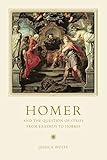Homer and the Question of Strife from Erasmus to Hobbes / Jessica Wolfe.
Material type: TextPublisher: Toronto : University of Toronto Press, [2015]Copyright date: ©2015Description: 1 online resource (624 p.) : 10 b&w illustrationsContent type:
TextPublisher: Toronto : University of Toronto Press, [2015]Copyright date: ©2015Description: 1 online resource (624 p.) : 10 b&w illustrationsContent type: - 9781442622678
- 883/.01 23
- PA4037.A2 .W777 2015eb
- online - DeGruyter
| Item type | Current library | Call number | URL | Status | Notes | Barcode | |
|---|---|---|---|---|---|---|---|
 eBook
eBook
|
Biblioteca "Angelicum" Pont. Univ. S.Tommaso d'Aquino Nuvola online | online - DeGruyter (Browse shelf(Opens below)) | Online access | Not for loan (Accesso limitato) | Accesso per gli utenti autorizzati / Access for authorized users | (dgr)9781442622678 |
Browsing Biblioteca "Angelicum" Pont. Univ. S.Tommaso d'Aquino shelves, Shelving location: Nuvola online Close shelf browser (Hides shelf browser)

|

|

|

|

|

|

|
||
| online - DeGruyter A Meeting of Minds : The Massey College Story / | online - DeGruyter Other Diplomacies, Other Ties : Cuba and Canada in the Shadow of the US / | online - DeGruyter E.J. Pratt: Letters / | online - DeGruyter Homer and the Question of Strife from Erasmus to Hobbes / | online - DeGruyter Civic Symbol : Creating Toronto's New City Hall, 1952-1966 / | online - DeGruyter Five Comedies / | online - DeGruyter Glimpses of Oneida Life / |
Frontmatter -- Contents -- Illustrations -- Acknowledgments -- Abbreviations -- Introduction: Homer and the Question of Strife -- Chapter One. Homer, Erasmus, and the Problem of Strife -- Chapter Two. The Remedy of Contraries: Melanchthon, Rabelais, and Epic Parody -- Chapter Three. Spenser, Homer, and the Mythography of Strife -- Chapter Four. Chapman’s Ironic Homer -- Chapter Five. The Razor’s Edge: Homer, Milton, and the Problem of Deliberation -- Chapter Six. Hobbes’s Homer and the Idols of the Agora -- Epilogue: The Homeric Contest from Vico to Arendt -- Notes -- Works Cited -- Index
restricted access online access with authorization star
http://purl.org/coar/access_right/c_16ec
From antiquity through the Renaissance, Homer’s epic poems – the Iliad, the Odyssey, and the various mock-epics incorrectly ascribed to him – served as a lens through which readers, translators, and writers interpreted contemporary conflicts. They looked to Homer for wisdom about the danger and the value of strife, embracing his works as a mythographic shorthand with which to describe and interpret the era’s intellectual, political, and theological struggles.Homer and the Question of Strife from Erasmus to Hobbes elegantly exposes the ways in which writers and thinkers as varied as Erasmus, Rabelais, Spenser, Milton, and Hobbes presented Homer as a great champion of conflict or its most eloquent critic. Jessica Wolfe weaves together an exceptional range of sources, including manuscript commentaries, early modern marginalia, philosophical and political treatises, and the visual arts. Wolfe’s transnational and multilingual study is a landmark work in the study of classical reception that has a great deal to offer to anyone examining the literary, political, and intellectual life of early modern Europe.
Mode of access: Internet via World Wide Web.
In English.
Description based on online resource; title from PDF title page (publisher's Web site, viewed 25. Jun 2024)


